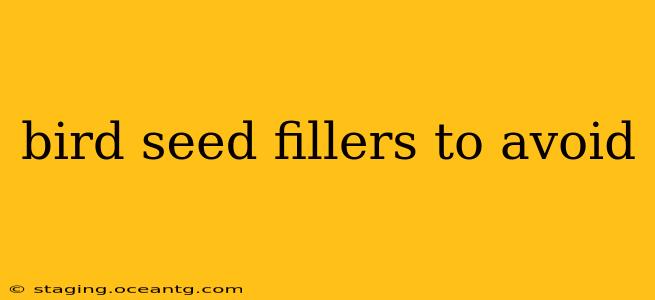Choosing the right birdseed is crucial for the health and well-being of your feathered visitors. Unfortunately, many commercially available birdseed mixes contain fillers that offer little nutritional value and can even be harmful to birds. Understanding which fillers to avoid is key to providing your birds with a nutritious and safe diet. This guide will highlight the common fillers to steer clear of and offer advice on selecting high-quality birdseed.
What are Bird Seed Fillers?
Birdseed fillers are inexpensive ingredients added to birdseed mixes to increase bulk and lower the cost for manufacturers. While they might seem harmless, many fillers lack nutritional value and can even contain substances harmful to birds. These fillers often make up a significant portion of the mix, leaving less room for the nutritious seeds birds actually need.
Common Bird Seed Fillers to Avoid:
1. Wheat:
While some birds might consume wheat, it's low in nutritional value compared to other seeds. It often fills up a bird's stomach without providing the necessary fats, proteins, and vitamins. For smaller birds, especially, wheat can be a significant problem, leading to them feeling full without getting the nutrients they require.
2. Oats:
Similar to wheat, oats are low in essential nutrients and primarily provide carbohydrates. While a small amount isn't harmful, excessive oats in birdseed can lead to nutritional deficiencies. Choose birdseed mixes with a minimal amount of oats or opt for mixes that exclude them altogether.
3. Milo (Sorghum):
Milo is a grain primarily used as livestock feed. It’s extremely low in nutritional value for birds and can displace more nutritious options in their diet. Birds often reject milo, leading to wasted seed and potential nutritional imbalances.
4. Corn:
While corn provides some energy, it's low in protein and essential fats compared to other birdseed ingredients. Corn can also be difficult for smaller birds to digest efficiently. Excess corn in birdseed can contribute to weight gain and lack of essential nutrients.
5. Cracked Corn:
Often found in cheaper mixes, cracked corn is another low-nutrient filler that provides mainly carbohydrates. It lacks essential amino acids, vitamins, and minerals vital for a bird's health.
What to Look for in High-Quality Birdseed:
Instead of focusing on fillers, prioritize birdseed mixes rich in:
- Sunflower Seeds (black oil): Excellent source of fat and energy.
- Nyjer (thistle) Seeds: A favorite of finches and other small birds, providing high energy and essential fatty acids.
- Safflower Seeds: A good source of healthy fats and protein.
- White-striped Sunflower Seeds: Similar nutritional value to black oil sunflower seeds but with a slightly lower fat content.
How to Identify Fillers in Birdseed:
Carefully examine the birdseed ingredient list. The ingredients are listed in order of weight, with the most prominent ingredient listed first. If wheat, oats, milo, or excessive corn are listed prominently, consider choosing a different mix. Look for mixes that prioritize high-quality seeds like sunflower, nyjer, and safflower.
Frequently Asked Questions (FAQs):
Can I feed my birds birdseed with fillers?
While a small amount of some fillers might not be immediately harmful, consistently feeding birds a diet primarily consisting of low-nutrient fillers can lead to nutritional deficiencies and health problems. It's best to choose birdseed mixes with minimal or no fillers and a high percentage of nutritious seeds.
Are all birdseed fillers bad?
No, not all fillers are harmful. Some, like small amounts of millet, can provide some nutritional value. However, many fillers offer minimal benefit and can negatively impact a bird's health. It's crucial to examine the ingredient list carefully.
How can I make my own birdseed mix?
Making your own birdseed mix allows you to control the ingredients and eliminate fillers. You can combine high-quality seeds like sunflower, nyjer, safflower, and peanuts (unsalted) to create a balanced and nutritious mix. Remember to research the specific dietary needs of the birds in your area.
By carefully selecting your birdseed and avoiding these common fillers, you can ensure your feathered friends receive the nourishment they need to thrive. Remember to always provide fresh water alongside the seed.
